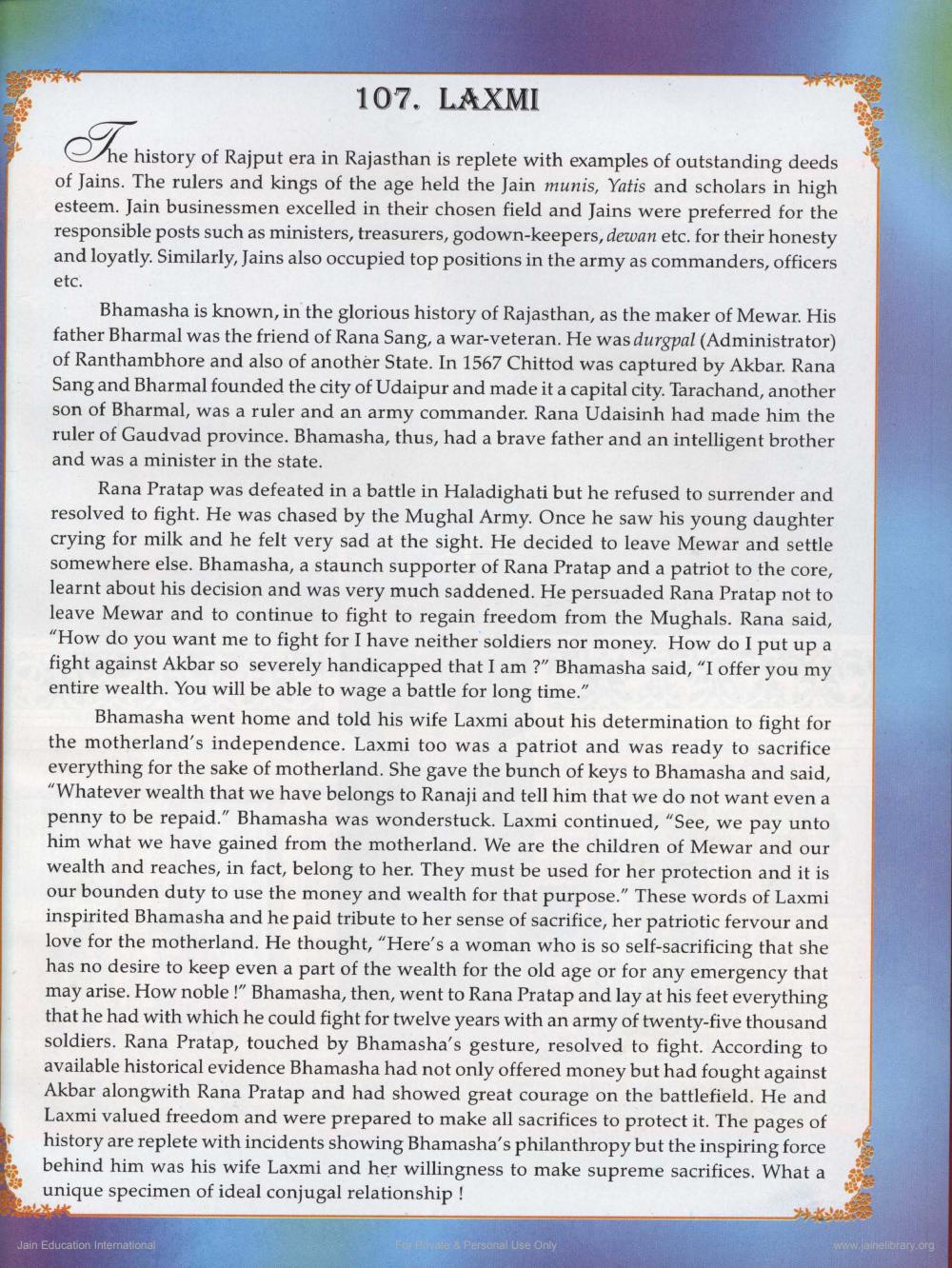________________
107. LAXMI
he history of Rajput era in Rajasthan is replete with examples of outstanding deeds of Jains. The rulers and kings of the age held the Jain munis, Yatis and scholars in high esteem. Jain businessmen excelled in their chosen field and Jains were preferred for the responsible posts such as ministers, treasurers, godown-keepers, dewan etc. for their honesty and loyatly. Similarly, Jains also occupied top positions in the army as commanders, officers etc.
Bhamasha is known, in the glorious history of Rajasthan, as the maker of Mewar. His father Bharmal was the friend of Rana Sang, a war-veteran. He was durgpal (Administrator) of Ranthambhore and also of another State. In 1567 Chittod was captured by Akbar. Rana Sang and Bharmal founded the city of Udaipur and made it a capital city. Tarachand, another son of Bharmal, was a ruler and an army commander. Rana Udaisinh had made him the ruler of Gaudvad province. Bhamasha, thus, had a brave father and an intelligent brother and was a minister in the state.
Rana Pratap was defeated in a battle in Haladighati but he refused to surrender and resolved to fight. He was chased by the Mughal Army. Once he saw his young daughter crying for milk and he felt very sad at the sight. He decided to leave Mewar and settle somewhere else. Bhamasha, a staunch supporter of Rana Pratap and a patriot to the core, learnt about his decision and was very much saddened. He persuaded Rana Pratap not to leave Mewar and to continue to fight to regain freedom from the Mughals. Rana said, "How do you want me to fight for I have neither soldiers nor money. How do I put up a fight against Akbar so severely handicapped that I am ?" Bhamasha said, "I offer you my entire wealth. You will be able to wage a battle for long time."
Bhamasha went home and told his wife Laxmi about his determination to fight for the motherland's independence. Laxmi too was a patriot and was ready to sacrifice everything for the sake of motherland. She gave the bunch of keys to Bhamasha and said, "Whatever wealth that we have belongs to Ranaji and tell him that we do not want even a penny to be repaid." Bhamasha was wonderstuck. Laxmi continued, "See, we pay unto him what we have gained from the motherland. We are the children of Mewar and our wealth and reaches, in fact, belong to her. They must be used for her protection and it is our bounden duty to use the money and wealth for that purpose." These words of Laxmi inspirited Bhamasha and he paid tribute to her sense of sacrifice, her patriotic fervour and love for the motherland. He thought, "Here's a woman who is so self-sacrificing that she has no desire to keep even a part of the wealth for the old age or for any emergency that may arise. How noble !" Bhamasha, then, went to Rana Pratap and lay at his feet everything that he had with which he could fight for twelve years with an army of twenty-five thousand soldiers. Rana Pratap, touched by Bhamasha's gesture, resolved to fight. According to available historical evidence Bhamasha had not only offered money but had fought against Akbar alongwith Rana Pratap and had showed great courage on the battlefield. He and Laxmi valued freedom and were prepared to make all sacrifices to protect it. The pages of history are replete with incidents showing Bhamasha's philanthropy but the inspiring force behind him was his wife Laxmi and her willingness to make supreme sacrifices. What a unique specimen of ideal conjugal relationship!
Jain Education Intémational
& Personal use only
www.jainelibrary.org




